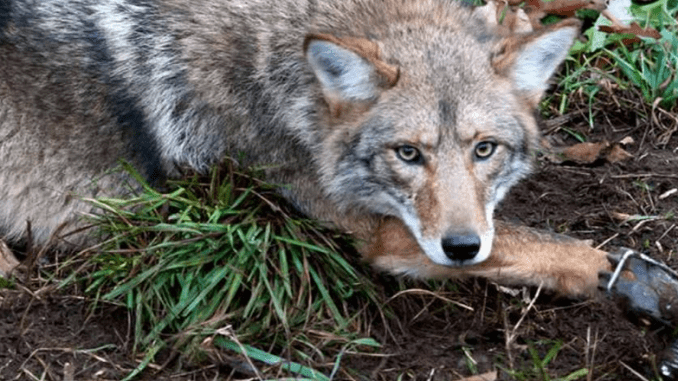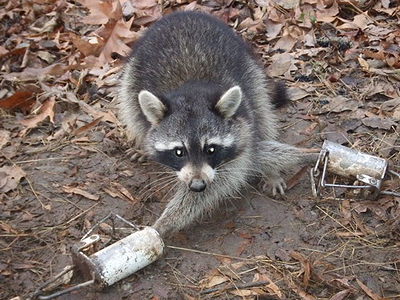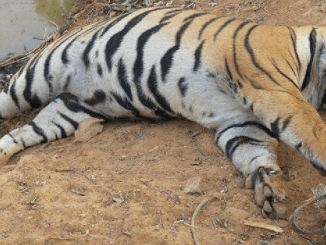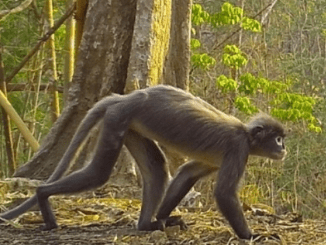
RENO, Nevada, December 13, 2021 (ENS) – Conservation groups WildEarth Guardians and Western Watersheds Project have filed a lawsuit against the U.S. Department of Agriculture’s Wildlife Services in Nevada over their plans to kill thousands of native animals in the state without proper environmental analysis of the impact of such large-scale slaughter.
Wildlife Services is a multimillion-dollar federal program that annually kills an average of 1.3 million native species nationally, according to its own reports, under the guise of “wildlife management,” largely in response to requests from the agricultural industry.
The lawsuit challenges Wildlife Services’ expansion of aerial gunning, poisoning, trapping, and shooting of foxes, bobcats, coyotes, mountain lions, beavers, badgers, rabbits, raccoons, ravens, and other wildlife on public land across Nevada, including the potential for killing wildlife within over six million acres designated as Wilderness Areas and Wilderness Study Areas.
“While society has evolved to understand the importance of native species as a key part of ecosystems and the need for coexistence with wildlife, Wildlife Services continues to rely on antiquated practices in the name of ‘managing’ conflicts with wildlife,” said Lindsay Larris, wildlife program director at WildEarth Guardians.
“Wildlife Services continually ignores the science about the efficacy of lethal management as well as the serious environmental impacts of its killing program,” said Larris. “We demand better from the federal government.”
Filed in Nevada’s federal district court, the lawsuit comes in response to a July 2020 decision that Wildlife Services’ “predator damage management” program, involving aerial gunning, trapping, and poisoning native wildlife posed “no significant impact” to the environment.
The lawsuit alleges that the agency’s analysis is deficient in multiple respects and that the indiscriminate killing of native carnivores and other wildlife does, in fact, cause negative impacts that warrant a much harder look from the government.
The lawsuit also faults Wildlife Services for failing to acknowledge the futility of lethal “control” of wildlife for the perceived purpose of protecting domestic livestock that the Bureau of Land Management and U.S. Forest Service, also named defendants in the case, allow to graze federal public lands, including within Wilderness Areas.
“Even though it devotes millions of dollars and thousands of person-hours each year to aerial gunning, poisoning, shooting, trapping, and otherwise killing thousands of animals across Nevada, and even though there is a growing body of science contesting the efficacy of these actions and pointing out their adverse environmental impacts, NV-Wildlife Services has unlawfully refused to prepare a comprehensive Environmental Impact Statement, EIS, disclosing the direct, indirect and cumulative effects of its Nevada ‘predator damage management’ activities, as required by NEPA (the National Environmental Policy Act),” the lawsuit states.

“The failure of federal land management agencies to take any action to protect wildlife on its land in the face of livestock-wildlife conflicts is a clear violation of federal law,” said Adam Bronstein, Nevada director at Western Watersheds Project.
“Both the Bureau of Land Management and the Forest Service have an obligation to protect federal lands and the wildlife that call them home for all of the American public, not just for select special interest groups. That obligation starts with, at a minimum, ensuring native species are not gunned down or poisoned in their habitat as a preventative measure,” Bronstein said.
In Nevada, Wildlife Services was responsible for killing at least 29 mountain lions, five foxes, two black bears, one bobcat, 2,493 ravens, and 3,662 coyotes in 2020 alone. Nearly all of the coyotes were killed via indiscriminate methods like aerial gunning, the use of inhumane methods like neck snares and foothold traps, and by devices known commonly as M-44 “cyanide bombs.”
Over the past five years, Wildlife Services has unintentionally killed 11 bobcats, four black bears, a mountain lion, a bighorn sheep, and multiple foxes in Nevada.
Much of Wildlife Services’ carnivore killing activities in Nevada occur on federal public land with over 15,000 coyotes killed on BLM or USFS-managed land in just the past five years, at the behest of private livestock operators in a handful of counties.
In 2017, Nevadans who were polled indicated strong support for the reform of the state’s trapping regulations in order to reduce the suffering of wildlife, and to protect pets and public safety.
In 2019, the Nevada Assembly Committee on Natural Resources, Agriculture, and Mining introduced Assembly Bill 473, which would have banned the use of leghold traps and reduced trap check time to 24 hours. It failed to become law.
While both the BLM and USFS authorize grazing permits on public lands they manage, neither agency provides any framework for management of wildlife-livestock conflicts on their land, even in wilderness areas, nor does either agency consider the negative ecological consequences of lethal wildlife “management” activities that occur as a result of livestock grazing programs.
“These federal lands are critical for preserving biodiversity and enabling native ecosystems to thrive – they are meant to be havens for wildlife,” said Jennifer Schwartz, staff attorney at WildEarth Guardians.
“The Wilderness Act mandates that these special areas be protected and managed to preserve their natural conditions,” Schwartz said. “While Congress allowed pre-existing livestock grazing to continue in wilderness areas, that does not license the killing of the very creatures that define the wildness of these remote and rugged landscapes.”
Over the last five years, litigation against Wildlife Services by WildEarth Guardians, Western Watersheds Project, and other conservation groups has resulted in settlement agreements and legal victories in Idaho, Wyoming, California, Nevada, Oregon, Montana, and Washington, all curbing the program’s slaughter of native wildlife and making the program more accountable for its activities.
Featured image: Wolf caught in a trap, Nevada. (Photo courtesy Born Free USA from its 2021 report, “Crushing Cruelty.”



